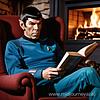Take a photo of a barcode or cover
This has long been on my list of books to read…I remember reading and loving Main Street as a graduate student. Sinclair Lewis is not was widely read as he was a generation ago… truly a shame when you consider his keen observations of human nature and his barbed wit that remains evergreen.
Lewis’s title character is the American Everyman: social climber yet longs to just be one of the boys, obsessed with money and status, attention and thrill seeking, and yet we sympathize with him because he is a mirror in which we see ourselves. Update some of Babbitt’s fashions and pastimes and this story is still as relevant to these ‘20s as is was to the ‘20s of the previous century. This book made me laugh and think. 5 stars.
Lewis’s title character is the American Everyman: social climber yet longs to just be one of the boys, obsessed with money and status, attention and thrill seeking, and yet we sympathize with him because he is a mirror in which we see ourselves. Update some of Babbitt’s fashions and pastimes and this story is still as relevant to these ‘20s as is was to the ‘20s of the previous century. This book made me laugh and think. 5 stars.
My husband recommended this book to me after having to read it for a college class. Positives: It was funny in a satirical kind of way. I learned some about life in the 20's. Nice to be able to say I read another classic. Negatives: it was so so boring. Really, not much happens. When something DOES happen its at the VERY end and still not that exciting. I only finished it to make my husband feel better.
Sometimes over the top. Funny, sad, oddly comforting knowing that sometimes things just don't change all that much.
Convinced that socialists from greater Minnesota write some of the best and most scathing satires of capitalism and the white political moderate.
100 years old, yet shockingly relevant to our times. Solid satire about social and political conformity. I appreciated how it allowed for hope for the next generation.
I liked this book, but didn't love it.
Watching Babbit vacillate between different desires and motivations for 400 pages was interesting and amusing. Yep, it was sarcastic, like all the reviews said. The moments where Babbit self-reflects are funny, but also few and far between. He's definitely a bit of a bumbler, stumbling between whatever he finds popular at the moment. I was satisfied though, with his lack of real character development.
Watching Babbit vacillate between different desires and motivations for 400 pages was interesting and amusing. Yep, it was sarcastic, like all the reviews said. The moments where Babbit self-reflects are funny, but also few and far between. He's definitely a bit of a bumbler, stumbling between whatever he finds popular at the moment. I was satisfied though, with his lack of real character development.
I'm now a big fan of Babbitt. It took me a few years to actually pick the book up and read it, but I'm glad I did. Poor Babbitt doesn't know what he wants from life. And while he may be incredibly narrow-minded and utterly conformed to the opinions of those around him, but he is also loyal, and fairly astute when he wants to be.
dark
There have been many books that explore the banality of modernity, the repetitious slog of capitalist existence, the ennui and boredom that comes from living in such a comfortable environment of security and status quo. Usually they involve a mid-life crisis or a sweeping change in worldview. Well, this book covers all that ground but has the added distinction of being one of the first to address any of these issues. And what's more, Lewis also has the foresight to predict what's coming for the rest of us, the relentless march into a dull, poetry-less swamp of regurgitated consumption and numbness and the (dead behind the eyes) mediocrity of modern living.
That being said, he does all this with a rather whimsical and even comic tone. Had he gone for something a little more weighty and bleak I might have enjoyed it significantly more. As it is, the book always skirts around the edges of its own themes and plays things for laughs. Lewis gives us a mercurial man (George F. Babbitt) living a standard middle-class life and infuses the narrative with joviality and silliness. Admittedly, this is due to Babbitt's own personality and demeanour (so it makes sense) but the fact remains it reduces the story's impact a little and makes everything somewhat comical and trivial (too much for my tastes). George is married with three kids and works in real estate. He is a Republican and a member of various well-to-do clubs. It's only with his breakdown that he questions any of this and (briefly) descends into chasing girls and embracing (equally conformist and performative) radical politics. The fact that his friend Paul Reisling has experienced a similar (but more consequential) breakdown is also a triggering factor. He begins to question his life. He begins to feel the weight of a cold and empty modernity on his shoulders.
The book feels very contemporary. By which I mean it feels like it was written in the '50s. All of the capitalist trappings of that particular time, the kitchen appliances, cars, movies, fast food, and straight-laced culture. But this book was published in 1922 and you can see that Lewis is not only crticising that period but also (quite accurately) pointing out what is to come. This might be how upper middle-class Babbitt lives his life now but it's also how we will all live in the future. Yes, the torment of nothingness he endures will be everyone's in the future. We will all stare at our partners with boredom, grow tired of the repetition, wonder what any of it amounts to, and grapple in the dark for any kind of answer. We will ALL be so thoroughly bored by life.
Anyway, I feel sad now. So I'm off to McDonalds. Then work. Then blah blah blah blah.
A great book.
That being said, he does all this with a rather whimsical and even comic tone. Had he gone for something a little more weighty and bleak I might have enjoyed it significantly more. As it is, the book always skirts around the edges of its own themes and plays things for laughs. Lewis gives us a mercurial man (George F. Babbitt) living a standard middle-class life and infuses the narrative with joviality and silliness. Admittedly, this is due to Babbitt's own personality and demeanour (so it makes sense) but the fact remains it reduces the story's impact a little and makes everything somewhat comical and trivial (too much for my tastes). George is married with three kids and works in real estate. He is a Republican and a member of various well-to-do clubs. It's only with his breakdown that he questions any of this and (briefly) descends into chasing girls and embracing (equally conformist and performative) radical politics. The fact that his friend Paul Reisling has experienced a similar (but more consequential) breakdown is also a triggering factor. He begins to question his life. He begins to feel the weight of a cold and empty modernity on his shoulders.
The book feels very contemporary. By which I mean it feels like it was written in the '50s. All of the capitalist trappings of that particular time, the kitchen appliances, cars, movies, fast food, and straight-laced culture. But this book was published in 1922 and you can see that Lewis is not only crticising that period but also (quite accurately) pointing out what is to come. This might be how upper middle-class Babbitt lives his life now but it's also how we will all live in the future. Yes, the torment of nothingness he endures will be everyone's in the future. We will all stare at our partners with boredom, grow tired of the repetition, wonder what any of it amounts to, and grapple in the dark for any kind of answer. We will ALL be so thoroughly bored by life.
Anyway, I feel sad now. So I'm off to McDonalds. Then work. Then blah blah blah blah.
A great book.
adventurous
challenging
funny
reflective
medium-paced
Plot or Character Driven:
Character
Strong character development:
Complicated
Diverse cast of characters:
No
Flaws of characters a main focus:
Yes
My first Lewis. Won’t be my last.




